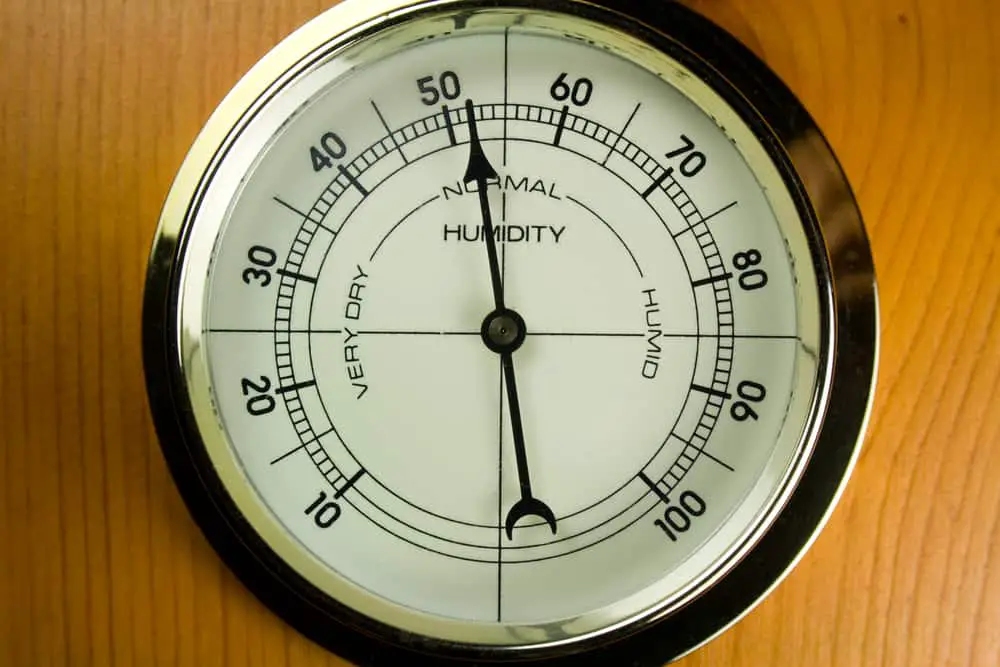Most people are oblivious to the humidity level in their garages.
Extreme humidity levels cause a lot of problems in your garage.
Too much humidity speeds up rusting in your vehicles and tools, whereas too low humidity can cause cracks on your concrete floor.
Therefore, it is apparent that your garage’s humidity level matters a lot.
So, What Should The Humidity Level Be In The Garage?
The optimal moisture condition for your garage is a relative humidity of 30-50%. This is the ideal humidity level for your garage to keep your tools and vehicles from rusting and prevent the floor from cracking.
See Also: Can You Keep a Tanning Bed in The Garage?
Why Humidity Level Is Important
If you live in humid areas with inclement weather conditions, you will likely experience a lot of humidity fluctuations in your garage.
During the cold weather months, humidity can go as high as 80-90%.
Freezing temperatures coupled with a lot of rainfall mean that a lot of vapors will be trapped in the air. This is a great concern for your garage as too much humidity enhances rusting.
In most cases, the garage has very poor air circulation; hence a lot of moisture is trapped inside in these humid conditions rusting kicks in, which is a big deal for your metallic equipment that is prone to rust.
It is time-consuming and expensive to restore rusted metals.
If left unattended, rusting can weaken the metal parts of your precious equipment. This damage will affect the function and safety of your vehicle or equipment.
Damp conditions not only cause problems with rust but will also support the growth of molds and, consequently, the development of mildew in your garage.
See Also: Why Don’t Garages Have Smoke Detectors?
The molds and mildew will make your garage smelly and unpleasant. Molds can also cause many health effects. Exposure to spores can cause a stuffy nose, sore throat, and even severe allergic reactions.
So, if you know the humidity level in your garage, you can take corrective steps to adjust the moisture level to the ideal level using a dehumidifier.
Five Causes Of High Humidity in Your Garage
There are plenty of possible sources of moisture in your garage. Consider the following causes:
1. Insufficiently Insulated Garage Door
Your garage has a wide entrance which allows snow and rainwater to seep in.
If it is inadequately insulated, you will have moisture problems.
2. Your Garage Is Usually Enclosed And Hence Has Poor Air Circulation
A lot of moisture is trapped inside. Moreover, you bring a lot of moisture when driving in your car or a bike from the rain.
3. Storing Damp Firewood In The Garage
Some people store wood logs in the garage, not knowing that they carry a lot of moisture.
See Also: Should You Store Firewood In A Detached Garage?
4. Operating A Dryer In The Garage
This will leave some moisture in your garage.
5. Clogged Floor Drain
A clogged floor drain retains some water which is a great source of moisture in your garage.
Five Ways Of Controlling Humidity in Your Garage
1. Use A Dehumidifier


A dehumidifier will physically extract excess water vapor from within the garage airspace.
This will lower your garage’s relative humidity and improve dry air circulation.
There are different models of dehumidifiers available in the market.
Make sure that you acquire a suitable type for your garage. A garage dehumidifier is more appropriate compared to ordinary models. They are compact and robust.
2. Use A Fan


Any type of fan used in your home will improve air circulation and help keep the humidity levels down in your garage.
3. Close All Doors And Windows
Keeping the windows and your garage door closed will help minimize humid air from creeping in.
4. Seal All Leaks
Check for any leaks that may have developed in your garage and try to fix them. Leaks allow humid air from the outdoors to seep through.
5. Store Vehicles Properly
If you are not using your car, clean it dry and park it in a cool and dry spot.
A humid garage will damage your car paint and rust the metal parts.
See Also: Is It Safe to Back Your Car into The Garage?
Two Ways To Measure Humidity Levels in Your Garage
1. Hygrometer


One such method is the use of a hygrometer. There are different types of hygrometers.
A digital hygrometer is more portable and easier to read. You can easily acquire them from any hardware store or order them online.
2. Moisture Meter


Another method of measuring your garage’s humidity level is using a moisture meter.
A moisture meter measures the air’s moisture.
You can easily acquire one from your local hardware stores or an online store. Choose one that is appropriate for your garage.
Final words
You are probably aware that your garage houses more than your car.
Therefore, it is important that you check the level of water vapor in your garage to avoid issues with humidity.
High humidity brings the challenges of rust and molds, while low levels can cause cracking on the concrete floor and warp your car’s body.
Monitor the humidity levels in your garage regularly and take corrective measures to bring it to the ideal levels of between 30% and 50%.
Sources
https://www.climatedry.co.uk/solution/garages/
https://www.upperleveldoors.ca/ca/blog/too-much-humidity-in-the-garage

